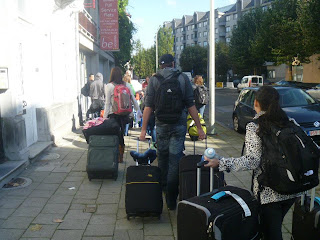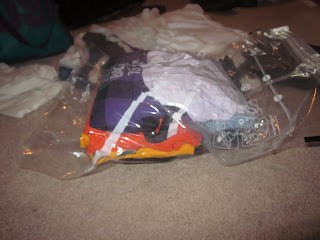Okay everyone, so you have bought your suitcase, your carry on, your extra bag for souvenirs, and your space saver bags, so what are you going to put in these bags? Here are some helpful hints that include what we were happy we packed, what we forgot, and what we wish we would have forgot.
The biggest thing to remember is DONT OVER PACK! You may have to carry all your stuff a long way... and how will you get everything home if you buy anything?!
What we brought:
Space Saver or Travel Bags- these are a must, if you want to know why read our earlier blog about them.
Food-(for all you picky eaters or cheapskates out there) granola bars, peanut butter, easy mac are all good ideas. Not only does it save money and provide a small taste of the states but after you consume it you have more room in your suitcase for the ride home.
Umbrella -even if you never use one in the states, it’s very hard to go on a tour in the pouring rain without one.
Water bottle- now this one is for all of you who do drink a lot during the day, if you never carry one, don’t own one and don’t drink that much then you really don’t need to go out in buy one just for this trip.
Ipod, Laptop(or IPad), Digital Camera - These are important electronics to remember they help pass time while traveling, they help you keep in contact with your friends and family back home and help you share your memories.
First Aid Kit- Band-Aids, rubbing alcohol, Tweezers, Nail clipers, Advil, Cold/Flu Medicine, cough drops, allergy medication and travel sickness medication. Pack it if you don't need it, someone will. You may end up with blisters from walking so much, motion sick from the planes, trains, subways, buses, boats, etc that you ride on, or you may just catch something.
What we forgot:
Extra Camera Batteries and/or Extra SD cards- you are going to take a lot of pictures. Be prepared! I went most of the trip without a Camera because either the battery was dead or my memory was full.
What we wish we forgot:
That extra sweater you thought you “might” wear- Really think about the clothes you are bringing are you really going to wear it? When you are constantly traveling, most of the time you aren’t checking a bag, you may go a week with only a carry on size bag, so leave the extra clothes in the states they just end up taking up weight.
Extra shoes/ scarves/ purses/ sunglasses/ hats- You are traveling to another country, you will most likely find these items over there and will want to purchase them. I don't know many people on the trip i went in that didn't buy one of these items, don't pack what you will end up buying.
Alarm Clock- If you can wake up to a phone alarm or a roommate yelling at you to wake up, you really don’t need to pack an alarm clock, it takes up space, weight and you might not ever use it. I didn’t use mine.
Travel Iron- If you are going to iron your clothes then fine bring one, if you aren’t don’t pack it. You aren’t going to be professionally dressed very often so if you’re only going abroad for around a month, you will be fine without it.
Just remember to think about everything you want to pack not just once, maybe not even twice but three or four or even more times before you actually put it in your suitcase. Weight is expensive, you don't want to leave to Europe with a 50 pound bag unless its filled with multiple pounds of things you will be leaving behind.
-Amanda



























